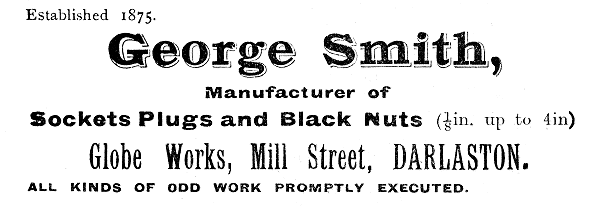|
An almost forgotten Darlaston man
became one of the early pioneers of the trades union
movement and greatly enlarged and amalgamated some of
the smaller unions. He was Richard Juggins, the son of a
Darlaston coalminer, born on 16th July, 1843, and
apprenticed to a local nut and bolt maker in 1850 when
only 7 years old. In
the 1881 census he is listed as living at 60 New Street
with his wife Elizabeth and their 8 children.
In 1870 he assisted in the
formation of the Nut & Bolt Association and became its
part-time secretary. Soon afterwards he became
unemployed and was made full-time secretary. His house
then became union headquarters. Under his guidance the
union rapidly grew to become the National Association of Nut & Bolt
Makers with branches throughout the midlands, the
north of England, and Wales.
In 1873 he instigated the
amalgamation of several local unions, including the Nut
& Bolt Association to form the Midland Counties Trades
Federation, which soon developed into an organisation of
significant size. Richard became Federation secretary at
a salary of £1 a week.
The membership grew to around
10,000 but by 1894 it had fallen to 4,000 as was
reported at the Annual General Meeting that year, held
in Darlaston Town Hall. A total of 47 delegates attended
the meeting during which Juggins was instructed to
launch a recruiting drive. By the following year the
membership had risen to 5,000.

An advert from 1922.
Juggins actively looked after the
interests of the union members. In the mid 1880s there
was a recession in the nut and bolt industry and many
manufacturers tried to undercut the competition. This
was achieved by reducing their production costs, and
persuading their craftsmen to accept a lower rate of
pay.
Juggins realised that this
situation was disastrous for the union members, and bad
for the industry as a whole. In January 1885 he met with
the Association of Employers in the nut and bolt
industry and made an agreement in which the employers
would employ only
members of the union, and Juggins agreed that union
members would only work for members of the Association
of Employers who did not undercut the competition.
Both
sides contributed to a fighting fund of £1,000 to be
used to support a strike at any firm that tried to
undercut the competition. It was a strange agreement in
that both the union and the employers were funding
future strikes in the industry.
The agreement only lasted for a
short while. After the original meeting, there was a
large-scale recruiting drive throughout the industry, and
mass meetings were held at Darlaston and Smethwick. One
employer, James Wiley of Eagle Works, Darlaston, who only
employed 25 men, refused to join in the agreement and
cut his worker’s wages by 5%. The other employers
followed his lead and the scheme collapsed.
Even though the scheme had failed, Juggins
continued to strive for fair wages in the industry, and
in 1889, on his suggestion, the South Staffordshire Nut
and Bolt Wages Board was set up. It consisted if 6
representatives from the employers and the union,
together with a chairman appointed by the employers. If
the board couldn’t agree on wages, the Mayor of
Birmingham acted as the single arbitrator. The wages
board was a great success and became the standard model
for similar schemes in other industries.

An advert from 1922.
Juggins continued to convince other
local craftsmen to form their own union. In 1886 he held
a meeting at Bloxwich with craftsmen in the bit forging
and filing industry and persuaded them to form a union.
In 1895 he persuaded the edge-tool makers of Wednesbury
to form a union and join the Midland Counties Trades
Federation. Juggins wanted every craft to have its own
union, which would be affiliated to the Federation, so that
unions could help each other in times of crisis.
The Midland Counties Trades
Federation regularly passed resolutions against the
employment of women and girls in the heavy industries of
the Black Country. As a result the TUC drew up a Bill to
prohibit the employment of women and girls in those
industries, which inevitably was rejected by Parliament.
The Federation played an important
part in the chain-makers’ strike in 1887 to 88. The
strike was sustained thanks to the efforts of the
Federation and Juggins himself, who travelled throughout
the country, visiting industrial areas and persuading
various unions to contribute to the chain-makers’ strike
fund. He channelled the funds to the union headquarters
at Cradley Heath. |